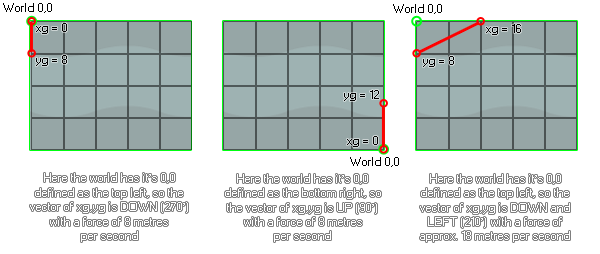
physics_world_gravity(xg, yg)
| 参数 | 描述 |
|---|---|
| xg | The x component of the gravity vector |
| yg | The y component of the gravity vector |
返回: N/A(无返回值)
As with all the physics functions,
physics_world_gravity will only work on an instance if the
room has a physics world defined for it in the room editor or using
physics_world_create. It
will then use the 0,0 defining point of the physics world to
calculate the direction and strength of gravity based on the vector
calculated from the xg and yg inputs. Here are some images to
illustrate...

As you can see, the xg,yg coordinates are relative to the
position of 0,0 as defined for the physics world, and the gravity
itself is calculated as a vector of those two components. So, the
default values of 0,10 will give you a gravity direction of down
(270 degrees) with an acceleration of 10 metres per second squared.
Note the metres per second squared! Like all the physics
functions, gravity is calculated using metres as a base measurement
so the pixel to metre scale that you set in
physics_world_create function is important here. Gravity
is also cumulative on the object (but the exact amount
depends on what you have set for the function physics_fixture_set_linear_damping),
meaning that in a room with a room_speed of 60, with no damping,
the instance will accelerate by 10 metres per second, every second
- which, if you have a 0.1 pixel to metre scale is the same as
saying it will accelerate to a speed of 100 pixels per second in 60
steps.
physics_world_gravity(-5, 0)
The above code will set gravity to be (assuming the room physics 0,0 is set to top left) to the right - 0 degrees - with an acceleration of 5 metres per second squared.